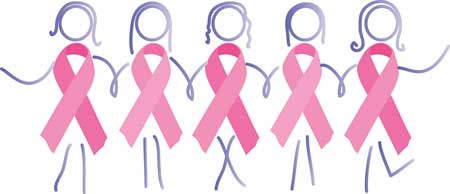October is officially celebrated as breast cancer awareness month all over the world. You! takes a look..
October is officially celebrated as breast cancer awareness month all over the world. You! takes a look..
Breast cancer is the second most common type of cancer that mainly affects women (breast cancer is rare in men). It develops from the breast tissue and if left undetected and untreated, the disease can spread to other areas of the body as well. Given the high incidence and destructive nature of breast cancer, early prevention and treatment of this disease is a high priority. It is due to this fact that spreading awareness of breast cancer has become a necessity and the month of October is dedicated to the cause.
How it all started
Breast Cancer Awareness Month is an annual international health campaign organized by major breast cancer charities every October. The special month is observed to increase awareness and to raise funds for research into its cause, prevention, diagnosis, treatment and cure. The ‘awareness month’ was founded in 1985 as a partnership between the American Cancer Society and the pharmaceutical division of Imperial Chemical Industries. Initially, the aim of this event was to increase the early detection of breast cancer by encouraging women to have mammograms. For those who don’t know, a mammogram is an x-ray of the breast used to detect abnormalities in the breast tissue. Early detection means that cancer can be more effectively treated and prevented from spreading to other areas of the body.
In 1993 Evelyn Lauder, Senior Corporate Vice President of the Estee Lauder Companies founded ‘The Breast Cancer Research Foundation’ and established the ‘Pink Ribbon’ as its symbol. Today, for the sake of spreading awareness, a variety of events around the world are organized in October, including walks, runs, seminars and breast cancer screening days etc. Many famous buildings and landmarks across the globe have been illuminated in pink light during this event; Sydney’s Harbour Bridge, Japan’s Tokyo Tower and Canada’s Niagara Falls to name a few. Due to the success of the awareness events, the colour pink is now associated with breast cancer awareness.
Awareness in Pakistan
Breast cancer is by far the most common cancer in women worldwide, both in the developed and developing countries. There are about 1.38 million new cases and 458 000 deaths from breast cancer each year (IARC Globocan, 2008). While breast cancer is rare in young women, it can affect them as well. In Pakistan, the prevalence of breast cancer - estimated at 38.5 per cent - is the highest amongst all the cancers. Moreover, breast cancer kills 40,000 Pakistani women annually. New cases of breast cancer from Pakistan have been reported to be the highest amongst all Asian countries with one out of every nine women in the country at a high risk. As compared to Pakistan, neighbouring country India has a rate of one in twenty-two women who are at a high risk of breast cancer. Currently, there is not sufficient knowledge on the causes of breast cancer; therefore, early detection of the disease remains the cornerstone of breast cancer control. When breast cancer is detected early, and if adequate diagnosis and treatment are available, there is a good chance that breast cancer can be cured. If detected late, however, curative treatment is often no longer an option.
Unfortunately, a lot of cultural and social taboos along with myths and misconceptions are associated with breast cancer, contributing to high mortality rates as most of the women report at stage III and IV, thus reducing the chances of survival. Societal and cultural norms combined with poor access to rural healthcare for females limit the access to information available on breast cancer and discourage both public and private discussions. The fact that people have yet to realise is that anyone can have breast cancer, and their lives will be made much easier if the disease is detected at an early stage. The survival rate of breast cancer increases to more than 90 per cent if diagnosed early. Yes, denial and ignorance won’t make the cancer go away and the best way to stop the problem is by facing it. To change the regressive attitude of most of the Pakistanis, Pink Ribbon Pakistan is taking numerous initiatives this year to spread awareness.
Pink Ribbon Pakistan
Pink Ribbon Pakistan is a non-funded, self-sustained organization, mostly supported by different government departments, contributions through public philanthropy and volunteers from all over the country. In the past few years, the campaign has been able to successfully reach out to over 1,050,000 women and 350,000 female students with knowledge and techniques to detect breast cancer at an early stage. Also, they had been provided free clinical examination and free mammogram screening. Since the campaign started, there has been a 30 per cent increase in patient turn-up at Breast Cancer Clinics nationwide.
 Breast Cancer Awareness Month 2016
Breast Cancer Awareness Month 2016
To mark October 2016 as the Breast Cancer Awareness Month, Pink Ribbon has once again launched a countrywide Breast Cancer Awareness drive in collaboration with Higher Education Commission and other public and private partners. The campaign will involve nearly 200 educational institutes across Pakistan to reach out to over 100,000 young girls, equipping them with necessary knowledge about the disease. Extensive awareness campaigns will also run on radio and TV, outdoor messaging and social media. This year’s Pink October campaign is majorly focusing on running a campaign for Pakistan’s first dedicated Breast Cancer Hospital being constructed by Pink Ribbon. The campaign is called the Brick campaign and is reaching out to people to donate a brick for construction of the hospital. There will also be a Pink illumination campaign on the 22nd and 23rd of October in Karachi, where Mazar-e-Quaid will be illuminated with pink lights.
Pinktober programmes
Here is a list of programmes that will be a part of the informative campaign this year.
Advisory services
One of the major reasons of high mortality with breast cancer in Pakistan is the low female literacy rate and lack of preventive health awareness among the masses. This is why Pink Ribbon provides advisory services that bring convenience for people who seek basic information about medical assistance to complex details of breast cancer. These services are available through phone, email, website, self-explanatory and easy to understand bilingual literature on prevention and early detection of breast cancer and referral information for treatment and healthcare providers.
(www.pinkribbon.org.pk)
Youth Awareness Programme
Recent trends have shown that young girls are also very likely to be hit by breast cancer in Pakistan. But no one ever suspects this deadly disease in a young girl due to the prevailing misconceptions attached to breast cancer. Therefore, Pink Ribbon has been running Youth Awareness Programme in collaboration with Higher Education Commission (HEC) since 2012. Through this programme, young women are informed about early detection methods, who resultantly also prove to be influencers for their mothers and other women in their families to remain health conscious and get regular check-ups.
National Screening Programme
Pink Ribbon Pakistan launched the first ever Breast Cancer Mobile Mammogram Clinic in collaboration with INMOL Cancer Hospital in 2009. The mobile unit has reached out to the poorest of the poor women for free screening services at their doorsteps saving thousands of precious lives. They also ran a free breast screening programme in 12 cities with the collaboration of 14 partner hospitals for 2 years. The objective of the programme was to serve the needy women and provide them with free services of clinical-examination, ultra sound, mammography and also assistance for further treatment if required.
Performing the breast self-exam (BSE)...

BSE or regularly examining your breasts on your own, can be an important way to find a breast cancer early. Performing a breast exam is no rocket science. All you need is your own hands and a mirror to get it done. Be sure to speak up and contact your doctor if you notice any changes. Stay abreast and aware of your health. It is recommended that all women routinely perform breast self-exams as part of their overall breast cancer screening strategy. Here are the five steps:
Step 1: Examine yourself in the mirror and look for puckering or bulging of the skin and/or redness or swelling around the chest area.
Step 2: Raise your arms and look for the same changes.
Step 3: Look for any signs of watery, milky, or yellow fluid or blood coming out of your nipples.
Step 4: Check the lower half of your breasts for lumps or humps by gently pressing your finger tips on the area.
Step 5: Cover the entire area using the same hand movements described in Step 4.